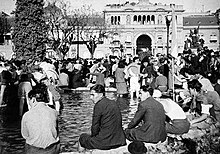20:
168:
to demand Perón's release from prison. While waiting for Perón on this hot day, many men in the crowd removed their shirts—hence the term "shirtless". However, there is much debate among scholars with regard to the origins of the label. Some claim that the word was coined to describe the
191:. This segment of the population was able to join the ranks of the middle class thanks to mass access to healthcare and education opportunities and the process of industrialisation that took place in Argentina during the first two terms of Juan Perón's presidency (1946-1955).
88:
of 1823. Hugo's character is commenting on the use of the term by the supporters of the French
Bourbons. The word was used pejoratively and in direct comparison to the derogative term applied to the French popular masses, the
122:
affectionately referring to their followers as "descamisados". During his 1945 campaign for president, Juan Perón toured the country on a train that he named
322:
327:
160:
By most accounts, the term has its modern origins on
October 17, 1945, when thousands of supporters of Juan Perón gathered in front of the
342:
253:
199:
149:
270:
337:
280:
332:
134:
195:
165:
129:
However, the first usage of the term in the history of
Argentina dates back to the 19th century.
23:
111:
173:, the social class from which Perón drew the greatest amount of his political backing. The
8:
130:
241:
73:
69:
276:
249:
188:
145:." ("Needless to say, this was planned to captivate the multitude, the shirtless.")
143:
Excusado es decir que esto era estudiado para captarse la multitud, los descamisados
64:
114:
from 1946 until 1955, and then again briefly from 1973 to 1974. The term was later
81:
77:
47:
42:
115:
85:
307:
138:
316:
183:
91:
107:
170:
154:
119:
161:
96:
59:
19:
68:
to refer to the revolutionary
Spanish masses. Following the defeat of
103:
80:) monarchy was restored to power. The Bourbons acted to prop up the
178:
102:
In the 20th century, it was also used as an insult by the elite of
84:
against the popular forces of the
Spanish social revolution in the
16:
Spanish term, usually referring to the revolutionary
Spanish masses
299:
220:
133:
described in his memories a time when he was walking with
50:
word that literally means "without shirt" or "shirtless".
246:
Juan Manuel de Rosas, el maldito de la historia oficial
248:. Buenos Aires: Grupo Editorial Norma. p. 39.
141:with dirty and torn clothes. Iriarte wrote that "
118:as a term of pride, with Juan Perón and his wife
314:
58:The term was originally used by the narrator in
153:was also the name of an anarchist newspaper in
308:Descamisado listing on Encyclopædia Britannica
240:
210:("shoeless") to refer to the poor people.
323:Argentine people by political orientation
18:
268:
181:have occasionally been compared to the
315:
41:
13:
26:, whose supporters were known as "
14:
354:
293:
272:A History of Modern Latin America
328:History of Argentina (1943–1955)
343:Working class in South America
262:
234:
1:
269:Clayton, Lawrence A. (2005).
227:
106:to describe the followers of
7:
213:
10:
359:
53:
338:Poverty in South America
196:Fernando Collor de Mello
135:Carlos María de Alvear
112:president of Argentina
62:'s seminal 1862 novel
43:[deskamiˈsaðo]
39:Spanish pronunciation:
31:
200:presidential campaign
22:
99:revolution of 1789.
333:Class-related slurs
300:Argentine magazine
74:Battle of Waterloo
70:Napoleon Bonaparte
32:
255:978-987-545-555-9
189:French Revolution
350:
287:
286:
266:
260:
259:
242:O'Donnell, Pacho
238:
131:Tomás de Iriarte
110:, who served as
82:Spanish monarchy
45:
40:
358:
357:
353:
352:
351:
349:
348:
347:
313:
312:
296:
291:
290:
283:
275:. p. 504.
267:
263:
256:
239:
235:
230:
216:
56:
38:
17:
12:
11:
5:
356:
346:
345:
340:
335:
330:
325:
311:
310:
305:
302:El Descamisado
295:
294:External links
292:
289:
288:
281:
261:
254:
232:
231:
229:
226:
225:
224:
215:
212:
157:, Argentina.
150:El Descamisado
139:Manuel Dorrego
124:El Descamisado
95:of the French
76:, the French (
65:Les Misérables
55:
52:
15:
9:
6:
4:
3:
2:
355:
344:
341:
339:
336:
334:
331:
329:
326:
324:
321:
320:
318:
309:
306:
304:
303:
298:
297:
284:
282:9780534621582
278:
274:
273:
265:
257:
251:
247:
243:
237:
233:
223:
222:
218:
217:
211:
209:
208:pés descalços
205:
201:
197:
192:
190:
186:
185:
184:sans-culottes
180:
176:
172:
167:
166:demonstration
163:
158:
156:
152:
151:
146:
144:
140:
136:
132:
127:
125:
121:
117:
113:
109:
105:
100:
98:
94:
93:
92:sans-culottes
87:
83:
79:
75:
71:
67:
66:
61:
51:
49:
44:
36:
29:
25:
21:
301:
271:
264:
245:
236:
219:
207:
204:descamisados
203:
193:
182:
175:descamisados
174:
171:working poor
159:
155:Buenos Aires
148:
147:
142:
128:
123:
101:
90:
63:
57:
34:
33:
28:Descamisados
27:
162:Casa Rosada
97:bourgeoisie
86:Spanish War
60:Victor Hugo
35:Descamisado
24:Loyalty Day
317:Categories
228:References
137:and found
108:Juan Perón
194:In 1989,
164:making a
120:Eva Perón
116:reclaimed
104:Argentina
244:(2009).
214:See also
179:Peronism
198:in his
187:of the
78:Bourbon
72:at the
54:History
48:Spanish
46:) is a
279:
252:
202:used
277:ISBN
250:ISBN
221:Roto
206:and
177:of
319::
126:.
30:".
285:.
258:.
37:(
Text is available under the Creative Commons Attribution-ShareAlike License. Additional terms may apply.
